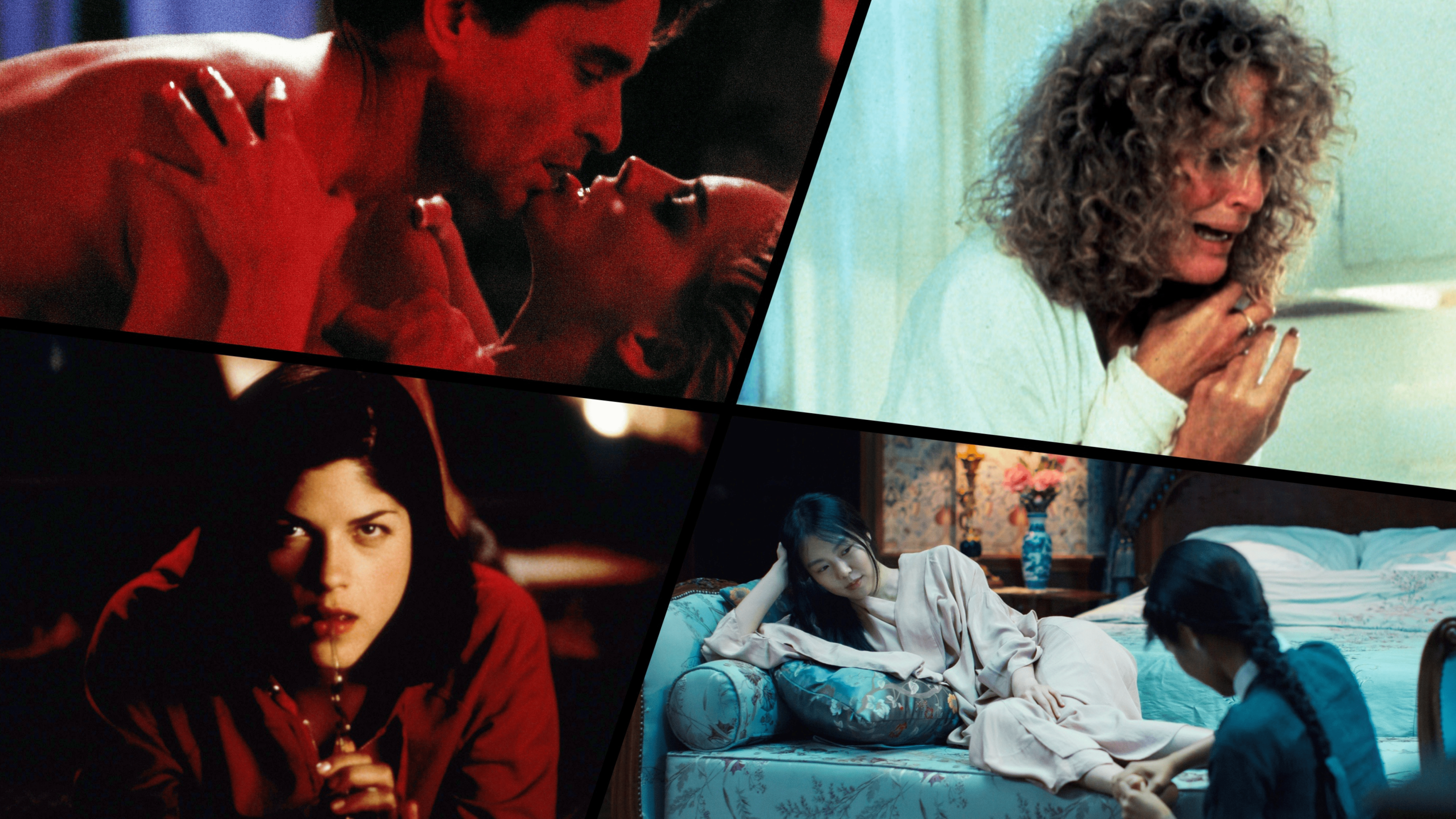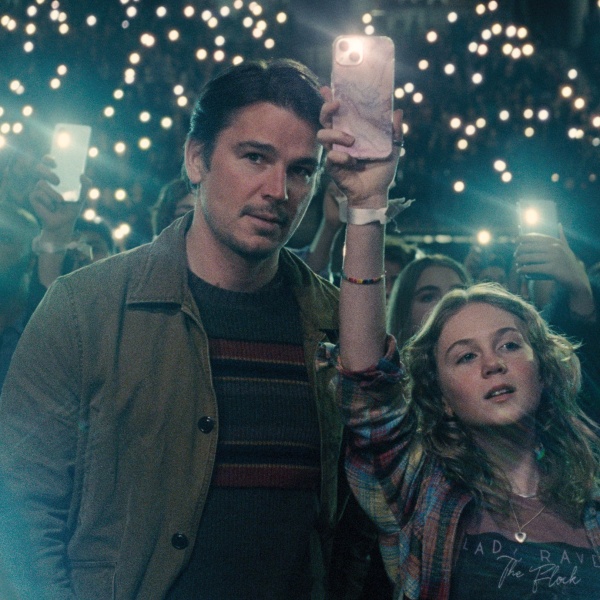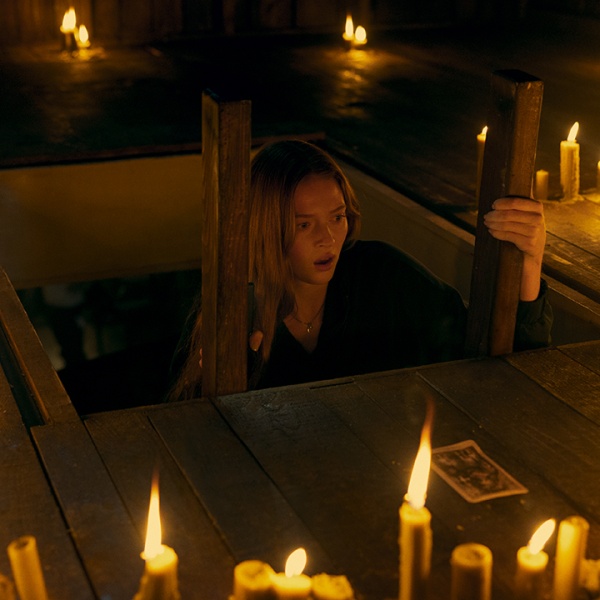[Editor’s Note: This story was originally published in March 2022 and has been updated since.]
The erotic thriller — the sleaziest and at one point most enduring genres of the 1980s and ’90s — seemed on the cusp of a comeback last year with the return of director Adrian Lyne. The master behind films like “Fatal Attraction” and “9 ½ Weeks” came back to screens (albeit small ones) with “Deep Water,” his first film in two decades since “Unfaithful” earned Diane Lane an Oscar nomination and one that firmly returns him to the erotic stomping grounds of his heyday.
Alas, the turgid drama, based on a Patricia Highsmith potboiler and starring a listless Ben Affleck and Ana de Armas as open lovers who detest each other, is a turkey, a straight-to-streaming dud that evokes better ideas from better movies and fails to be neither erotic nor thrilling.
Still, “Deep Water” can serve as a twofold instruction point: for Hollywood to dig deeper to come up with hopefully better erotic thrillers and for viewers to revisit or, for the first time, discover the movies that precipitated “Deep Water’s” existence in the first place.
Last year, Karina Longworth took filmgoers back in time to the “Erotic ’80s” with the latest season of her “You Must Remember This” podcast, looking back on Hollywood’s quintessential erotic thrillers, body horrors, neo-noirs, and sex comedies. The first part of the season debuted last spring, with the follow-up “Erotic ’90s” this year diving into the erotic movies of the 1990s that defined the genre. The season also explored how “Basic Instinct” and all its attendant controversies in 1992 exploded the psychosexual thriller drama and caused studios to start churning out them out at a fast pace to replicate its winning formula — and to often dismal, desperate-seeming results.
And this year at the Sundance Film Festival, Chloe Domont’s “Fair Play” put the defibrillators to the genre with a shocking workplace psychosexual thriller starring Alden Ehrenreich and Phoebe Dynevor. Netflix scooped it out of the festival for a cool $20 million — expect this to be a big hit on the streaming platform when it drops later this year.
In the meantime, IndieWire picks 27 of the best movies from Hollywood’s golden age of erotic thrillers to now, kicking off with 1980’s “Cruising” and ending with a few recent titles that fit the bill.
Jude Dry and Samantha Bergeson contributed to this story.
-
“American Gigolo” (1980)

Image Credit: Paramount / courtesy Everett Collection Paul Schrader made Richard Gere a bona fide movie star with this glitzy vision of Los Angeles, a hyper-stylized sexual playground for Gere’s lover-for-hire Julien, who becomes embroiled in a criminal plot. The movie most famously features a full-frontal Gere at a time when onscreen male nudity was still an anomaly — leading to much specualation over his sexuality for years to come.
-
“Cruising” (1980)

Image Credit: United Artists / courtesy Everett Collection William Friedkin’s seedy gay leather scene thriller “Cruising” stoked protests from New York City’s gay community during its production in 1979. More than four decades later, this brutal and explicit film hasn’t lost its capacity to shock and confound. Al Pacino plays a New York cop who goes undercover as a member of the underground S&M scene to track down a serial killer of gay men. Friedkin doesn’t shy from either the gruesome murders or gay male sex act, as evidenced in one particularly pungent edit that draws a paralell between anal penetration and a knife ripping into flesh. What rankled many viewers (gay and straight) was the film’s suggestion that, by the end, Pacino’s character has been somehow “turned” by his time undercoer.
-
“Dressed to Kill” (1980)

Image Credit: ©Orion Pictures Corp/Courtesy Everett Collection Brian De Palma owned the erotic thriller genre in the 1980s thanks to films like “Body Double” and “Dressed to Kill,” which features a cross-dressing killer, Angie Dickinson as a housewife murdered in the film’s first act, and Nancy Allen as the sex worker who pieces it all together. This stylish Hitchcock riff originally had an X rating before De Palma took it back to the edit — at the time, some critics felt it was basically softcore pornography while others praised De Palma’s lurid Manhattan vision.
-
“Body Heat” (1981)

Image Credit: Warner Bros. / courtesy Everett Collection Casual moviegoers might be shocked to learn that “Body Heat,” Lawrence Kasdan’s Southern-fried neo-noir twist on “Double Indemnity,” is the big-screen debut of actress Kathleen Turner. Her sultry turn as Matty Walker, who enters into a murder-plotting affair with a crooked lawyer (William Hurt), still burns a hole in the screen 40 years later. The film’s censor-pushing sex scenes were ultimately truncated in the final cut, but that hardly tempers the steam radiating off this ’80s classic that launched Turner’s reputation as a screen siren.
-
“Body Double” (1984)

Image Credit: Columbia / courtesy Everett Collection Brian De Palma’s exhilarating and erotic “Body Double” proved the director was no Hitchcock copycat, as this film blends the voyeurism of “Rear Window” and “Vertigo” with his own X-rated, 1980s-tastic sensibilities. While the film’s graphic sex scenes were cut to achieve an R rating, there’s still an abundance of flesh on display — as well as a phallic drill that’s surely one of cinema’s most brutal instruments of murder. Melanie Griffith plays a porn star who leads out-of-luck (and out-of-a-girlfriend) actor Jake Scully (Craig Wasson) into the netherworld of Los Angeles’ adult entertainment industry. Rising star Griffith brings intelligence and even a dash of dark wit to a role that could’ve been sidelined in another actor’s hands.
-
“Fatal Attraction” (1987)

Image Credit: Paramount / courtesy Everett Collection The erotic thriller that launched them all, Adrian Lyne’s “Fatal Attraction” is much more than the sum of its stewed bunnies and grand guignol, last-act literal bloodbath. It’s a “Madame Butterfly”-esque operatic tragedy about two Manhattanites (Michael Douglas and Glenn Close) who let their libidos get the better of them when a weekend of wild adulterous sex turns obsessive. While Close’s Alex Forrest may be remembered by some moviegoers as the psychotic stalker lover from hell, Close plays her more as a tragic figure — which may have been lost in the edit and the movie’s “gotcha!” ending.
-
“Angel Heart” (1987)

Image Credit: Everett Collection In the mid-1980s, Mickey Rourke was the poster child for erotic films thanks to Adrian Lyne’s psychosexual drama “9 1/2 Weeks” (not quite a thriller, but certainly erotic) and Alan Parker’s seedy, sweltering New Orleans-set neo noir “Angel Heart.” Rourke plays a New York City private eye hired by Robert De Niro’s unsubtly monikered Louis Cyphre to solve a missing-persons case in New Orleans. His dark journey into a string of brutal murders leads him to Epiphany Proudfoot, a disturbed young woman played by Lisa Bonet, whose hallucinatory sex scene with Rourke initially landed the film an X rating. As Bonet’s character was meant to be 17 (the actress was 20 at the time of the film’s release), this very-feel-bad movie would never be made the same today.
-
“Dead Ringers” (1988)

Image Credit: 20thCentFox/Courtesy Everett Collection “Dead Ringers” is less an erotic erotic thriller than one that probes our twin obsession with sex and death: Jeremy Irons plays twin gynecologists Elliot and Beverly Mantle, who pretend to be one another while passing a woman back and forth (Claire Niveau) — until she finds out. Cronenberg’s gloomy 1988 movie, based on the book “Twins” by Bari Wood, takes a downward spiral as Beverly becomes addicted to prescription drugs and obsessed with creating gynecological instruments meant to be used on mutant women.
-
“The Cook, The Thief, His Wife, and Her Lover” (1989)

Image Credit: Miramax / courtesy Everett Collection Peter Greenaway’s X-rated masterpiece threw acid in the face of arthouse moviegoers looking for a decorous period piece. Instead, this alternately repulsive and erotic chamber thriller — set in a Jacobean-inspired French restaurant out of time and place — mixes sex, violence, and death with giddy, crimson-colored style. Helen Mirren plays Georgina, the battered wife of despicable gangster Albert (Michael Gambon), who takes up a doomed affair with an erudite book dealer who frequents Albert’s establishment. All hurtle toward an awful, cannibalistic destiny — but they look fabulous doing it in Jean-Paul Gaultier costumes that are just to die.
-
“The Comfort of Strangers” (1990)

Image Credit: Skouras Pictures / courtesy Everett Collection Sex and death were the primary colors in the sick early novels of “Atonement” writer Ian McEwan, and “The Comfort of Strangers” is no exception. Paul Schrader’s adaptation follows an unmarried English couple (Rupert Everett and Natasha Richardson, both drop-jaw gorgeous) on a charged vacation through the sinuous channels of Venice. It’s there they meet a twisted couple, played by Christopher Walken and Helen Mirren, who rope them into their S&M tricks and homoerotic mind games.
-
“Single White Female” (1992)

Image Credit: Columbia Pictures / courtesy Everett Collection Barbet Schroeder’s “Single White Female” instantly became such a cultural touchstone that its title inevitably became a shorthand for getting completely sucked dry by the roommate from hell. Bridget cuts a cool figure as software designer Allie who, after a tumultuous breakup, takes on a roommate to share costs on her (quite stunning and spacious) Upper West Side apartment. That roommate, the mentally unstable Hedy (Jennifer Jason Leigh), soon plunges Allie into a waking nightmare. While the film doesn’t make Allie and Hedy’s “Persona”-like bond explicitly erotic, the question of whether Hedy wants to fuck Allie or be Allie looms over this sexually tense film.
-
“Basic Instinct” (1992)

Image Credit: TriStar Pictures / vourtesy Everett Collection “Basic Instinct” was a landmark for erotic thrillers, and few have bested it since. Paul Verhoeven’s twisted murder mystery grossed over $352 million worldwide as audiences fell for the psychological game between a cop (Michael Douglas) and a novelist (Sharon Stone) who might be an ice pick-wielding murderer. —SB
-
“Damage” (1992)

Image Credit: New Line Cinema / courtesy Everett Collection Louis Malle adapts Josephine Hart’s compact, nasty little novel about an upper-class London affair gone horrifically wrong to the level of a Greek tragic opera. Jeremy Irons is a fledgling politician who engages in volatile sexual assignations with his son’s fiancée, played by a deliciously soulless Juliette Binoche. Malle directs some of the most wildly choreographed sex scenes put to film, making this elegant adaptation a standout of early ’90s psychosexual thrillers.
-
“Sliver” (1993)

Image Credit: ©Paramount/Courtesy Everett Collection Phillip Noyce’s “Sliver” found Paramount Pictures trying to recapture the fervor around Sharon Stone’s erotically charged, femme-fatale turn in “Basic Instinct,” one of the biggest box-office hits of 1992. However, after much studio meddling and poor reviews, “Sliver” turned out an utter disaster when it opened in May 1993 despite the pedigree of Stone (playing a very different kind of psychosexual-thriller damsel, here a neurotic thirtysomething book editor). William Baldwin, Tom Berenger, and Martin Landau are in the cast, and cinematographer Vilmos Zsigmond behind the camera. The film’s original ending saw Stone and Baldwin’s characters flying a helicopter into, that’s right, a volcano, but it was replaced by something less opaque for a mass audience. “Sliver” is shlock, but enjoyable shlock nonetheless.
-
“The Last Seduction” (1994)

Image Credit: ©October Films/Courtesy Everett Collection Linda Fiorentino was a Best Actress Oscar nominee hopeful in 1994 for John Dahl’s neo-noir “The Last Seduction” until a television premiere on HBO prior to a theatrical release barred the movie from Academy consideration. Too bad, because her femme-fatale turn as a telemarketer on the run from her crook husband should’ve made her an even bigger star. The film is perhaps most famous for a scene in which Fiorentino fucks Peter Berg’s character, her latest seduction, up against a fence — he’s totally in thrall to her manipulative behavior, and Fiorentino remains committed to Bridget’s heartlessness until the very end.
-
“Bound” (1996)

Image Credit: GramercyPictures / courtesy Everett Collection Long before the Wachowskis became a worldwide sensation with “The Matrix” and before either came out as trans, the directing duo nevertheless showed an early interest in queerness with the erotic noir “Bound.” Gina Gershon and Jennifer Tilly star as ex-con Corky and femme fatale Violet, probably the best queer partners-in-crime cinema had seen up to that point, as they try to con an evil mafioso (Joe Pantoliano) out of $2 million. Their erotic chemistry has made the film a lesbian classic.
-
“Eyes Wide Shut” (1999)

Image Credit: ©Warner Bros/courtesy Everett Collection / Everett Collection Stanley Kubrick found threads of vulnerability within Tom Cruise and Nicole Kidman deeper than arguably any other filmmakers have or had of the once-married couple who divorced two years after the release of “Eyes Wide Shut.” Kubrick’s swan song and somnambulant fever dream finds Dr. Bill Harford (Cruise) ambling through a Pinewood Studios-created New York City at nighttime after his wife, Alice (Kidman), confesses to an almost-infidelity from years prior. “Eyes Wide Shut” is never exactly thrillingly erotic: The film’s bombastic orgy centerpiece is too meticulously choreographed by a certain control freak to be either of those things, but the sequence, which has been subject to cuts and AI edits across different versions, is an eerie one. Meanwhile, Bill’s brushes with a subterranean secret society of the haute-bourgeoisie are insidiously creepy. Though if anything, “Eyes Wide Shut” might be more erotic comedy than traditional thriller — no better illustrated than in the film’s final line, in which Alice, reconciling with her husband in a toy store, tells Bill what they need to do as soon as possible: fuck.
-
“Crash” (1996)

Image Credit: Fine Line / courtesy Everett Collection Not entirely thrilling and not entirely erotic, David Cronenberg’s J.G. Ballard adaptation “Crash” nonetheless deserves prime placement on a list of any 1990s erotic thrillers. Somewhere between softcore porn and body-horror freakout, this archly directed and chilly film centers on a quartet of clinically drawn nymphomaniacs who are aroused by the spectacle and carnage of car crashes. Deborah Kara Unger is perfectly dead inside as the wife of James Spader, whose open marriage spins out upon the introduction of Holly Hunter as a sexually insatiable doctor and Elias Koteas as a crash fetishist obsessed with mining sexual pleasure from reenacting iconic Hollywood deaths.
-
“Cruel Intentions” (1999)

Image Credit: Columbia Pictures / courtesy Everett Collection What isn’t erotic and thrilling about Roger Kumble’s 1999 spin on the French epistolary novel “Dangerous Liaisons”? It’s the sexiest teen thriller ever made and surely still one of the most transgressive — and defining for many a gen Yers’ sexual awakening. From Ryan Phillippe’s iconic backside to Joshua Jackson and Eric Mabius naked in a bed and the twisted dynamic of Phillippe and Sarah Michelle Gellar as way-too-close stepsiblings, “Cruel Intentions” is a hot and heavy riot, smartly mining the bawdy original’s baked-in sauciness.
-
“Vanilla Sky” (2001)

Image Credit: Everett Collection Cameron Crowe’s twisty and erotic lucid dream “Vanilla Sky” met a mixed response at the time — perhaps because filmgoers were expecting something on the level of his prior film “Almost Famous” — but his vision of a New York media mogul’s (Tom Cruise) ego death remains a loopy trip. Cameron Diaz is memorably unhinged as his psychotic paramour (“the saddest girl to ever hold a martini”) while Penélope Cruz delivers outstanding work as the woman he truly loves but can’t attain. Most of the film’s sex scenes are more disturbing than hot, but “Vanilla Sky” stands as a great example of early-2000s, high-budget, high-concept movies for adults only during arguably the genre’s last dying breath.
-
“Unfaithful” (2002)

Image Credit: 20th Century Fox Film Corp. Adrian Lyne’s return to the erotic stomping grounds of “Fatal Attraction” and “9 1/2 Weeks” rightly earned Diane Lane an Oscar nomination for her portrayal of a restless Connecticut housewife who throws her life down the toilet for a devastatingly handsome rare book dealer played by Olivier Martinez. Richard Gere is memorably tragic as the sappy cuckold, but Lane and Martinez’s often brazen sex scenes make this a scorching essential in the erotic thriller canon.
-
“Demonlover” (2002)

Image Credit: ©Palm Pictures/Courtesy Everett Collecti / Everett Collection Olivier Assayas’ post-Y2K “Demonlover” is pure chaos, a steampunk-inspired portrait of early 2000s aesthetics with a score by Sonic Youth and a round-up of demented performances from Connie Nielsen, Chloe Sevigny, and Gina Gershon that feel ripped out of late-night Cinemax in its heyday. Assayas clashes an espionage plot surrounding the takeover of a Japanese anime studio by a hostile corporation with a much seedier underworld beneath it: that of an American internet company called Demonlover that distributes snuff films and S&M torture porn online. Nielsen’s character, frosty exec Diane de Monx, gets in too deep on the dark web, while the bodies start piling up, and her assistant Chloe Sevigny plots an infiltration of her own.
-
“Swimming Pool” (2003)

Image Credit: ©Focus Films/Courtesy Everett Collection François Ozon tributes Jacques Deray’s “La Piscine” and Claude Chabrol’s “La Ceremonie” with this Hitchcockian erotic thriller. It centers on an uptight British mystery writer (Charlotte Rampling) trying to defeat writer’s block while summering in the South of France and chipping away at her next novel. That is, until a wily Ludivine Sagnier arrives claiming to be the publisher’s daughter, bringing sexual chaos and eventually murder into Sarah’s (Rampling) world. The film’s sexual content and nudity nearly earned the film an NC-17 before Focus Features made cuts to secure a successful arthouse run in the U.S.
-
“In the Cut” (2003)

Image Credit: Screen Gems / courtesy Everett Collection Wildly misunderstood upon its 2003 release and mostly excoriated by critics, Jane Campion’s moody, oozy psychosexual slasher movie “In the Cut” is perhaps the first great narrative feature response to September 11 and the malaise permeating NYC at the time. Campion lurks in the Lower East Side underbelly of Manhattan, following high school English teacher Fanny (a haunted and introspective Meg Ryan) down the black hole of desire as she takes up a masochistic affair with a grizzled detective (Mark Ruffalo) who might also be a serial killer.
-
“Stranger by the Lake” (2013)

Image Credit: Strand Releasing / courtesy Everett Collection Alain Guiraudie’s “Stranger by the Lake” unfairly earned a bad rap from gay viewers who thought it perpetuated the trope of gay sex leading to tragedy, a great injustice to such a finely tuned erotic thriller. Set mostly in the single location of a French lakeside cruising ground during one lazy summer, it follows Franck (Pierre Deladonchamps) on his daily exploits as he befriends the older Henri (Patrick d’Assumçao) and finds himself attracted to the menacing Michel (Christophe Paou). After witnessing a shocking event one evening, Franck pursues Michel anyway, well aware of how dangerous it may be. Guiraudie cuts the tension with humor, letting it simmer just beneath the surface. Through Henri, Guiraudie explores the ripe territory of a non-sexual relationship in a cruising context, as well as cross-generational gay friendships. It’s a rare look inside a world open to so few. Guiraudie never forgets Franck risks his life with each anonymous encounter, and this unsettling tension drives the film to its inevitable conclusion. —JD
-
“The Handmaiden” (2016)

Image Credit: Magnolia Pictures / courtesy Everett Collection One of the best movies of the 21st century, Park Chan-wook’s inspired adaptation of Sarah Waters’ novel “Fingersmith” is also one of the hottest. Moving Waters’ lurid con story from Victorian England to Japanese-occupied Korea, Park and period costumes are a very pretty match indeed. From the opening shot in the rain to stunning erotic poses as pretty as a painting, the imagery alone is enough to stimulate certain cinephiles. But the star-crossed romance between the sheltered Lady Hideko (Min-hee Kim) and her sprightly handmaiden, Sook-hee (Tae-ri Kim) provides plenty of loaded exchanges. Park strays from the source material, pushing the story to lewd extremes with the mysterious all-male gatherings at which Hideko’s evil guardian auctions off his rare erotica collection. But the sexiest scene has to be the consummation of Hideko and Sook-hee’s flirtation, which graciously holds nothing back. (Even if that inverted bridge scissoring position is totally ridiculous). —JD
-
“Fair Play” (2023)

Image Credit: Sundance Film Festival All is not fair in love and war and finance. In fact, it’s ugly, cruel, sexy, and trashy.
Writer/director Chloe Domont’s vicious assault on ambition, attraction, masculinity, and you-go-girl feminism, “Fair Play” goes off like a bomb laced with the explosive and dually depraved chemistry of leads Phoebe Dynevor and Alden Ehrenreich. They play a New York couple who can’t keep their hands off each other. They also both work in finance. They also happen to work at the same investment firm, yet none of their colleagues knows about their elaborate and longstanding violation of company policy. What starts as one movie on the surface, a sort of refresh on the psychosexual thrillers of the 1980s spearheaded by the likes of Adrian Lyne and since all but dead in Hollywood, then slithers into another perhaps more reminiscent of HBO’s finance episodic “Industry,” then another, and another. By the final jaw-dislocating cut to black, you’ll have no idea what just thwacked you. —RL





